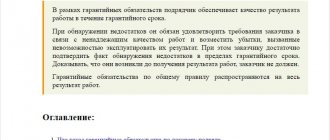Giving false testimony is a factor that makes it impossible to conduct a quick, correct investigation of a crime, leading the investigation along the wrong path. False data misinforms investigative, inquiry and judicial authorities, therefore such reports are generally considered socially dangerous.
Giving false testimony is a criminal offense. However, sanctions will only be applied to a citizen who deliberately lies during interrogation. If a citizen is in good faith mistaken in his words, he will not bear criminal liability.
Criminal liability under the article of the Criminal Code of the Russian Federation for giving false testimony
First of all, it is necessary to understand in what cases liability for giving false testimony in court occurs. To do this you need to refer to Art. 307 of the Criminal Code of the Russian Federation. Criminal punishment is not possible in all cases. It is important to know that indications are divided into two types:
- false;
- obviously false.
The difference between these types of testimony from a legal point of view is enormous. The first category includes information that the witness himself is confident in. That is, he may not know the truth or not fully know it. We are talking about an unintentional mistake that occurred without prior agreement. In this case, there is no liability for giving false testimony.
Note!
Liability for giving false testimony under the Criminal Code can only arise if you provide false information in court or to law enforcement agencies. Deliberate deception of other officials cannot lead to the initiation of either an administrative or a criminal case.
The only reason for criminal prosecution is the giving of knowingly false testimony. This means that a participant in a trial or a witness enters into a preliminary conspiracy with someone and tells a lie, knowing it. If the truth becomes known, the person who committed perjury must be punished in accordance with the provisions of the Criminal Code of the Russian Federation. The same is true for false information in administrative cases.
Note!
Before the start of interrogation by an investigator or at a court hearing, participants in the process and witnesses must be notified of liability for giving false testimony.
The most obvious example of such deception is testifying about the location of the defendant. For example, a witness says that the defendant was walking with him in the park at the time the crime was committed, but in reality this turns out to be untrue, and the defendant is really guilty. In this case, a criminal case will be initiated under Article 307 of the Criminal Code of the Russian Federation.
Giving false testimony in an administrative case article
For perjury, punishment is possible not only under the Criminal Code, but also under the Code of Administrative Offenses. In particular, liability for giving false testimony is determined by Art. 17.9 Code of Administrative Offences. Acts falling under the norms of this document are considered to be false information presented by a witness, expert, or specialist during the hearing of administrative cases.
Giving false testimony in a criminal case article
Please remember that knowingly giving false testimony is a criminal offense. Responsibility arises under Art. 307 of the Criminal Code of the Russian Federation. It can be applied if a witness, expert or specialist, realizing the untruthfulness of the information presented, commits perjury when considering criminal cases. This also includes a deliberately incorrect translation, which can mislead law enforcement officers or the court.
Giving false and knowingly false testimony
As mentioned above, liability comes not for false testimony in general, but for knowingly false testimony - the falsity of which the witness knows. For example, evidence of an alibi of the defendant will be deliberately false testimony when a witness tells the court that the defendant was at his home at the time of the commission of the crime, whereas in reality such a fact did not take place.
If a witness provides the court with information that does not correspond to the truth, but the witness himself is confident in its correctness - liability under Art. 307 of the Criminal Code of the Russian Federation will not occur. Thus, a witness, assuring the court that he saw the defendant in some place and identified him by his jacket and hat, without seeing his face, will not be considered deliberately false if it is established from external surveillance cameras that there was no one in that place the defendant, and another person wearing similar clothing. That is, the witness was mistaken in his testimony and, giving it, was confident that he was telling the truth.
Punishment for giving false testimony in court
Often witnesses are interested in the question of how many years you can get for giving false testimony. Perjury can result in a real prison sentence.
Art. 307 of the Criminal Code of the Russian Federation includes two parts. The first provides for punishment for giving knowingly false testimony during an investigation or trial of all types of criminal cases, with the exception of grave and especially grave ones. The consequences of such actions may be as follows:
- fine up to 80 thousand rubles;
- compulsory work up to 480 hours;
- correctional labor for up to 2 years;
- arrest up to 3 months.
The penalties are quite serious, but in this case there is no threat of imprisonment for a long term. However, if perjury is committed at hearings in criminal cases classified as serious or especially serious, the consequences can be much more serious. In particular, penalties for giving false testimony under Part 2 of Art. 307 of the Criminal Code of the Russian Federation are as follows:
- up to 5 years of forced labor;
- up to 5 years of imprisonment.
What is the penalty for a witness for giving false testimony?
If a witness gives evidence in court, he must be clear about what he is saying and what the consequences may be. That is why before each interrogation they are required to warn him about possible criminal liability.
We have already mentioned possible punishments in the previous paragraph, but situations vary. In particular, third parties may go to great lengths to induce perjury from a witness. For such acts there is a special article in the Criminal Code - Art. 309. It provides for liability for inducing witnesses to give false testimony during investigations or court hearings in criminal cases. The document provides for punishment for the following methods of inducing a person to provide false information:
- bribe;
- blackmail;
- violence that does not pose a threat to life;
- violence that threatens life and health.
If you are a victim of such acts, you must notify the court. In this case, you cannot be prosecuted for giving false testimony. An investigation will begin against the person who tried to induce you to deceive law enforcement agencies or the court. Punishment for bribery – from 80 thousand rubles. fine, up to 3 months of arrest. If violence was used against you, the perpetrator may be sentenced to 3 to 7 years in prison.
Deliberately false denunciation
Knowingly false denunciation is another form of giving untruthful testimony. Prosecution is possible if a person came to law enforcement agencies and reported committing a crime that in fact did not happen. In this case, denunciation is accompanied by giving false testimony during interrogation. However, if it can be proven that the accused person did not commit such actions, then the citizen who provided false information about the crime will be held accountable.
Responsibility for knowingly false denunciation comes under Art. 306 of the Criminal Code of the Russian Federation. There are three parts of this article, providing for punishments for acts of varying severity. If a denunciation was made in a case that does not fall into the categories of grave or especially grave, then the applicant may be fined 120 thousand rubles, subject to mandatory (up to 480 hours), compulsory (up to 2 years) or correctional (up to 2 years) work. In addition, imprisonment for up to 2 years is possible.
If an untruthful denunciation and knowingly giving false testimony were committed in a case classified as grave or especially grave, the punishments will be more severe. In particular, the maximum fine increases to 300 thousand rubles, and the maximum term of forced labor or imprisonment can be up to 3 years.
In addition, liability is provided for false denunciation, giving false testimony and falsifying evidence. If a citizen deliberately falsifies evidence in order to mislead the investigation, he may be punished by correctional labor for up to 5 years or imprisonment for up to 6 years.
False and deliberately false testimony
Liability for perjury is established by Art. 307 of the Criminal Code of the Russian Federation. This article applies only to evidence provided to the court and law enforcement agencies during the investigation of criminal cases. Testimony given in another situation - for example, to a representative of a local government body, a house manager, a representative of a voluntary squad or a security guard in a store, even in writing in the form of an explanation - cannot be considered giving false testimony - Article 307 of the Criminal Code of the Russian Federation does not cover such acts. The witness, expert and interpreter must be warned in writing about liability for perjury before the start of the interrogation.
At the same time, it is important to know that liability is provided specifically for KNOWINGLY false testimony, that is, those testimony the falsity of which at the time of its giving the witness is sure and reliably knows.
If the interrogated person is mistaken in good faith in the circumstances reported to the court, liability under Art. 307 of the Criminal Code of the Russian Federation will not occur.
Is it possible to avoid liability for giving false testimony?
If you testify in court, then by presenting false information you are already putting yourself at serious risk. Therefore, if you are offered anything for giving untruthful testimony, refuse. It doesn’t matter who exactly asks you for this, a relative, an acquaintance or just a third party.
If you gave false testimony, but then changed your mind, report this at the next meeting. If you notify the court in a timely manner, you will not be prosecuted. However, you may not be punished only if you report misinformation during the trial, and not after the decision is made. Admitting to giving false testimony after a decision has been made will not free you from administrative or criminal liability. The only thing you can count on is the court accepting the confession as a mitigating circumstance.
Reason to remain silent
Under this article, a citizen has the right not to testify against himself, his spouse and close relatives, whose circle is outlined by law. Everything seems to be simple. But there are difficulties.
In what cases can a person use this article? There are no restrictions: neither by procedural status (eyewitness, witness, victim, suspect, accused), nor by the type and stage of legal proceedings, as well as regardless of any form of communication and with all officials.
The main thing is that any attempt to limit the right to remain silent, citing the fact that Article 51 can, for example, only be used by the accused, will be a violation of constitutional human rights. As well as the prohibition to use it, for example, during an oral conversation with any law enforcement officer, in any situation.
How to use the article correctly and when is it appropriate?
It happens when citizens are questioned or interrogated by law enforcement officers and are not asked about their willingness to answer questions. If a refusal is made without reference to Article 51, they may write in the protocol: “the citizen refused to answer the questions posed.” This is often used as a method of putting pressure on a person. When interrogated in a criminal case, such an answer may lead to criminal liability for refusal to testify.
But if a person answers the same question: “When answering the question posed, I will use Art. 51 of the Constitution,” then such a response is not considered a refusal. When citing a constitutional right, citizens are not subject to liability for refusing to testify.
Who are close relatives according to the law? Where are the boundaries of the concept of “not incriminating yourself” and what information falls under this? The right to remain silent extends not only to self-incrimination, but also prohibits being forced to testify against close relatives. These are spouses, parents, children, adoptive parents, adopted children, siblings, grandparents, grandchildren. That is, according to the Constitution, you can not give any information that concerns these people, be it their personal life or work.
It is important that the law also distinguishes another category - “close persons”. These include “other persons” whose life, health and well-being are dear to a person due to existing personal relationships. By the way, this category includes people in a so-called civil marriage.
What does it mean to “not incriminate yourself”? There is no clear limitation in the law. This should be decided by the citizen himself, and not dictated to him by someone else.
It is important that failure to explain Article 51 of the Constitution to a citizen may lead to the interrogation protocol being recognized as inadmissible evidence.
And one more interesting feature of this article. The Constitutional Court of the Russian Federation explained in one of its decisions that the right not to testify against oneself presupposes not only the possibility of refusing to testify, but also from providing the authorities with objects and documents, etc., that could testify against oneself.
The right to remain silent extends not only to self-incrimination, but also prohibits being forced to testify against loved ones and relatives.
Any misleading of a person about his right to use Article 51 is a violation of his constitutional rights and freedoms.
But often a person’s complete refusal to answer questions, hiding behind this article, makes it possible to conduct the investigation in a direction that is unfavorable for the citizen. And this must be remembered.
Summary
Giving false statements is a criminal offense. However, a distinction should be made between giving false and deliberately false testimony. In the first case, a person can testify to something without really knowing, but being confident in his words. In this case, he cannot be held accountable. If a witness, specialist or expert lies to the court, knowing about it, this is a reason to initiate a criminal case. Responsibility arises under Article 307 of the Criminal Code and for such acts you can get up to 5 years in prison.
Examples from judicial practice
Example one: Gr. B. during the investigation of a theft from an apartment, trying to create an alibi for his friend, Mr. D., assured the investigation that this citizen was fishing with him. During further investigation, it turned out that Mr. B. gave deliberately false testimony. For this he was prosecuted under Art. 307, part 1, with a fine of 20 thousand rubles.
Example two: Citizen P., being in a deeply hostile relationship with her neighbor in the stairwell, gr. R. accused him of pushing her at the entrance to the entrance; she fell and broke her arm. During the investigation, thanks to a security camera installed at the entrance, it was established that gr. P. fell without assistance, slipping on the ice. The court accused the citizen of giving false testimony and brought her to justice under Art. 307, part 1 with payment of a fine in the amount of 80 thousand rubles.
Any questions you may have can be asked in the comments to the article.







